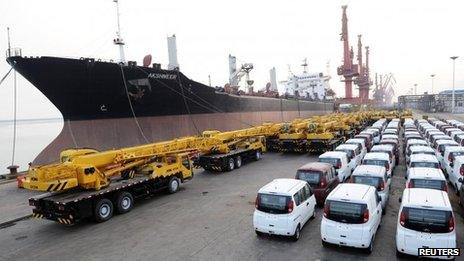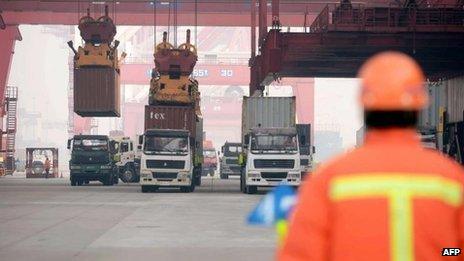New titleholder? China says it is world's largest trader
- Published
- comments

China's latest trade figures show it is "very likely" to have overtaken the US as the world's largest trader. It would topple the position that the US has held for much of the last century and cross another milestone in rivalling the biggest economy in the world.
For some, it is perhaps surprising that China didn't already hold this position. After all, four years ago, China became the world's largest exporter of goods. But it's the surge in imports that has propelled Chinese trade - exports and imports - to hit a record $4.16 trillion in 2013 ($2.21 trillion in exports plus $1.95 trillion in imports). Although the full-year US trade data isn't yet available, the first 11 months saw US trade at $3.57 trillion. This is why it seems that China has probably overtaken America.
The increase in imports is notable. It implies a greater opening of Chinese markets, which is what matters for the rest of the world seeking new consumers and sources of demand. So far, China's markets are still frustratingly closed in certain segments, which is why the rise in imports is so important.
Plus, the bulk of Chinese trade is in goods and not services. Trade in services is less than half of that of the US, which exceeded $1 trillion in 2012. As China is seeking to increase the size of its services sector, which I have written about before, it implies there is much more potential growth in the relatively closed sector.
Rapid expansion
Even with its relatively closed markets, China has grown its tradable sector quickly. Export-orientation was one of the main targets of market-oriented reform in 1978.
China sought to join global production chains by opening up special economic zones that were essentially export-processing zones. By attracting foreign direct investment (FDI) into those zones to utilise its cheap and plentiful labour, China was able to gain export expertise while protecting its domestic market.

China's global trade has risen rapidly
This is the origin of the imbalance between exports and imports in China, since imports were restricted into the internal market while exports were promoted. Also, most imports were intermediate goods, such as energy and raw materials, and not consumer goods, which were only 5% of imports.
By 1992, China's "open door" policy had taken off when Deng Xiaoping expanded special economic zones across the country after seeing the success of the initial ones. It led to an era where exports grew on average at 17% a year, doubling the pace of overall economic growth. The increase in trade was even faster after China joined the World Trade Organization (WTO) in December 2001, which made it a part of the multilateral trade body that accounts for nearly all of world trade.
Within a decade, China rose from having a share of global merchandise exports of less than 3% to more than 10%. The US and Germany each have a share that is just smaller than that of China, while Japan accounts for around another 5%. So, altogether, these four countries account for over one-third of global goods trade.
However, there are doubts over the accuracy of Chinese trade statistics as with other areas. Export figures have been inflated by the use of faked invoices to disguise capital flows and evade controls. A crackdown by the Chinese government last May revealed that such invoices inflated the size of exports by $75bn in the first quarter of 2013, according to Chinese media reports. If so, that implies about $300bn faked over the whole year - a sizeable amount.
But even if China doesn't overtake the US this year, it is likely that the country which is over four times larger than America in population eventually will. When it does, then trade will mark another chapter in the re-emergence of China.
According to economic historian Angus Maddison, China was the dominant economy in the early 19th Century but fell behind after the 1820s when it it didn't experience an industrial revolution like the ones seen in Britain, America and Germany. It could be the dominant economy once again. But, as nations which have been felled by crisis know all too well, size isn't the only determinant of economic might or resilience.